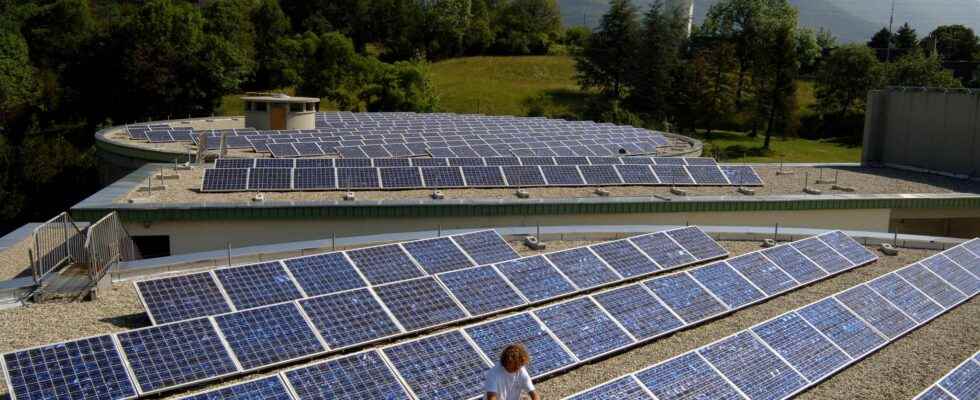Overshadowed by the news around the pension reform, the bill “relating to the acceleration of the production of renewable energies” (ENR) was adopted by the deputies at first reading by 286 votes against 238, this Tuesday 10 January. The Senate had already largely supported the text in early November. The support of the PS and the majority of the small independent group Liot saved the government from a few cold sweats in the National Assembly, while the ecologists had announced an abstention and the other opposition groups a vote against.
With AFP, the Minister for Energy Transition Agnès Pannier-Runacher praised the “responsible positions” of the Socialists and Liot as well as the work of “co-construction” carried out to accelerate the deployment of offshore wind and photovoltaic energy. in France.
Many industry representatives and local elected officials also welcomed the news. “It is a turning point, because it is the first law in France dedicated to renewable energies. It is also the first time that certain subjects have been put forward: planning, the redistribution of the fruits of the transition…”, said in particular declared to AFP Michel Gioria, general delegate of France Energie Eolienne (FEE). Other unions, such as that of renewable energies (RES), are delighted with the general scope of the text, while pointing out some doubts about the ability of the text to really change the situation. L’Express presents the main provisions of the text to you, even if a joint joint committee to be held on January 24 will lead to several changes, given the major differences in versions between the text released by the Senate and then by the Assembly.
In concrete terms, the latter aims to reduce installation times and catch up with France’s marked lag in terms of green energy compared to its European neighbours: 19.3% of gross final energy consumption, well below European neighbours. France has therefore not kept its promises since it had undertaken, in 2020, to reach 23%. For 2050, President Emmanuel Macron had already committed to multiplying by ten the production capacity of solar energy to exceed 100 GW, and to deploy 50 wind farms at sea to reach 40 GW.
Five years of procedures are on average necessary in France to build a solar farm, 7 years for a wind farm and 10 years for an offshore wind farm. The text adopted on Tuesday evening thus provides for temporary adaptations of administrative procedures to simplify and accelerate the completion of projects, the objective being to significantly shorten deployment times. In addition, the government intends to reduce certain recourses, by recognizing an “imperative reason of major public interest (RIIPM)” for renewable energy projects, which makes it possible to circumvent certain blockages during the development of projects related to the protection of particular species.
- Municipal planning and approval
It was one of the most sensitive subjects of the text. After a compromise found in the Senate, the municipalities will now be able to bring up – in a “bottom-up” planning system – the priority acceleration zones for deploying renewable energy projects. For the application phase of these “conducive” zones, the approval of the mayor will be required.
The measure has tensed the left, which fears the return of the “veto of the mayors” demanded by LR deputies for the whole territory. With the exception of rooftop production processes, these areas cannot be included in national parks and nature reserves, the Assembly said.
- “Limit Visual Saturation”
The Assembly adopted at first reading environmental amendments to set up an observatory and a mediator for renewable energies. For better “acceptability”, the deputies added to the text a landscape objective encouraging communities to “limit the effects of visual saturation”, in particular wind turbines. In order to better distribute renewable energies on the territory, the text makes possible a tariff modulation which would encourage project promoters to settle in areas with a priori less favorable natural conditions.
- More space for solar and offshore wind
The bill facilitates the installation of photovoltaic panels near highways and major roads. It makes it possible to derogate from the Coastal law, in a very constrained framework, for the installation of panels in “wastelands”. It also facilitates setting up in mountain communities. It imposes the gradual equipment of outdoor car parks of more than 1,500 m2 with photovoltaic shade structures. In 2021, photovoltaic solar energy represented only 3.1% of national electricity consumption in France, compared to 14.2% in Spain and 10.9% in Germany according to figures from the Ministry of Ecological Transition.
The bill proposes to pool public debates on the location of offshore wind farm projects “to improve spatial planning” and accelerate their development. The Assembly rejected in session LR amendments demanding that settlement areas be located at a minimum distance of 40 kilometers from the shore. However, “priority targets will be favorable areas located in the exclusive economic zone”, i.e. a little more than 22 kilometers from the coast, and outside national parks with a maritime part.
- Fuel poverty
On the proposal of the Socialists, the Assembly waived a principle of rebate on the bill of residents of renewable energies. MEPs favor broader territorial measures such as funds to help low-income households in fuel poverty or to finance projects in favor of biodiversity.
The text intends to define “agrivoltaism”, combining agricultural exploitation and electricity production, for example with solar panels mounted on feet, allowing the cultivation or even the passage of animals. Agricultural production should remain “the main activity” or the installations should be “reversible”. Overall more restrictive definitions than expected by the carriers of the sector, who believe that they will limit the development potential of this technology.
